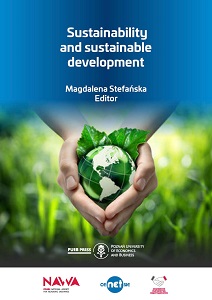Sustainable development in the non-governmental organisation sector
Sustainable development in the non-governmental organisation sector
Author(s): Agnieszka Chomiuk
Subject(s): Economy, Business Economy / Management, Energy and Environmental Studies, Civil Society, Labor relations, Environmental and Energy policy, Cultural Anthropology / Ethnology, Social development, Sociology of the arts, business, education, Economic development, Environmental interactions, Marketing / Advertising, Social Norms / Social Control, Human Resources in Economy, Business Ethics
Published by: Wydawnictwo Uniwersytetu Ekonomicznego w Poznaniu
Keywords: Housing First method;homelessness crisis;social capital;social cooperative;social enterprise;
Summary/Abstract: The described project assumes the development of a new method for solving the problem of homelessness, in particular, with regard to the field of supporting people in an exceptionally difficult situation or those suffering from mental disorders and/or addictions to achieve independence and overcome problems. The aforementioned project is the first attempt at implementing this method in Poland. The basic assumption of the method is to solve the main problem of a person in the homelessness crisis, which is the lack of housing, and only then to provide support in solving other problems. The aim of the chapter is to give rise to discussion on the innovative solutions implemented by one of the local government to remedy the problems of homeless people. The issue is based on SDGs. The second described case study is the “Safe Future of People with Intellectual Disability”—implemented by the Polish Association for People with Intellectual Disability—reflecting the tested model based on support circles, i.e. social support networks in order to empower people with intellectual disabilities. The main objective of the “Safe Future” model is to develop and implement solutions that ensure legal, financial and social security of people with intellectual disabilities in situations where they have lost the support of the family. The concept of the support circles tested in this model is based on built networks of connections rooted in the social capital generated among the local community. The last example of sustainable development in the non-governmental sector is Social Cooperative Sunny Hill—as a social enterprise it is a unique entity on the market. It conducts economic activity, the main goal of which is not profit, but social and professional re-integration of people at risk of social exclusion. Contrary to a traditional enterprises, it does not distribute the profit among shareholders, but allocates it to social purposes.
Book: Sustainability and sustainable development
- Page Range: 219-226
- Page Count: 8
- Publication Year: 2021
- Language: English
- Content File-PDF

